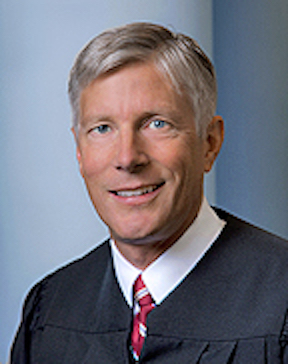Iowa Supreme Court Justice Thomas Waterman has again refused to recuse himself from hearing a challenge to a new state law, without disclosing his communications with policy-makers while that bill was pending in the legislature.
As Bleeding Heartland previously reported, Waterman denied the appellants’ first recusal motion and did not clarify whether he “consulted with, advocated with and/or encouraged” state legislators or staff for Governor Kim Reynolds to pass a bill changing judicial selection and shortening the chief justice’s term.
Bob Rush, a plaintiff in the case as well as an attorney representing the plaintiffs, filed a motion for Waterman to reconsider on September 23. He noted that Chief Justice Mark Cady’s order of recusal recounted that shortly before Republican lawmakers approved the bill, a Supreme Court justice “generally confirmed” a report about justices “telling legislators that they think the bill is good policy and should vote for it.”
In addition, the motion cited a Des Moines Register article identifying Waterman as a justice who had communicated with state legislators, including the House floor manager, State Representative Steven Holt.
6. These facts and circumstances place appellant in a difficult position. Appellants are not questioning whether Justice Waterman can act in a fair and impartial manner. They do not believe Justice Waterman is biased.
7. However, the question is under this unique set of facts and circumstances whether a reasonable person could question this justice’s fairness and impartiality.
8. Therefore appellant respectfully requests this justice reconsider his prior order and recuse himself.
9. Should this justice decline to recuse himself, appellant requests he make a public record disclosing all relevant facts and circumstances relating to the claim of disqualification.
Waterman denied the request in a September 24 order. Full text:
I have carefully considered the motion to reconsider filed by Appellant Bob Rush. I respectfully deny his motion, and reiterate that I said or did nothing requiring my recusal or further comment. Pursuant to my duty under Rule 51:2.7 of the Iowa Judicial Code, I will participate in our court’s impending decision whether to retain or transfer this case to the court of appeals.
He did not address the Iowa Supreme Court cases cited in the motion to reconsider, or a judicial rule calling for recusal “in any proceeding in which the judge’s impartiality* might reasonably be questioned […].” An explanatory note under that rule instructs,
A judge should disclose on the record information that the judge believes the parties or their lawyers might reasonably consider relevant to a possible motion for disqualification, even if the judge believes there is no basis for disqualification.
In a September 23 radio interview with Fort Dodge-based radio host Michael Devine, State Representative Ann Meyer confirmed part of the chief justice’s account, saying she spoke to Cady by phone on April 26. Unfortunately, Devine did not ask Meyer whether other Supreme Court justices had called, texted, or met with her to advocate for the bill, as Cady’s recusal order indicated.
Cady disqualified himself from hearing the appeal, but not because of his discussions with key players, which he described in detail. The other five Iowa Supreme Court justices opted to hear the case, but only Justices Brent Appel and David Wiggins confirmed that they did not promote passage of the bill. Justices Edward Mansfield, Susan Christensen, and Christopher McDonald followed Waterman’s example, declining to recuse without stating whether they had any relevant communications with lawmakers or staff for the governor.
UPDATE: James Q. Lynch reported for the Cedar Rapids Gazette that Waterman denied the recusal motion but did not acknowledge that evidence in the public record shows the justice spoke with legislators about the bill. That context is important.
SECOND UPDATE: Waterman and the three other conservative justices kicked this case over to the Iowa Court of Appeals. Justices Appel and Wiggins would have retained the appeal to be heard in the Supreme Court.


3 Comments
Unfortunately?
I’m guessing Devine did not want to know if other justices lobbied the legislators. It was not likely just fortune that prevented his asking the question.
iowavoter Tue 24 Sep 10:58 PM
It seemed to me
that he did not want to put Ann Meyer on the spot about this. She has been misleading people locally about the lobbying that occurred.
Laura Belin Wed 25 Sep 10:33 AM